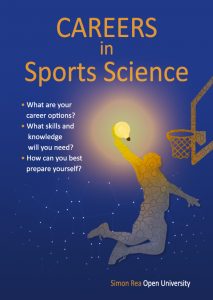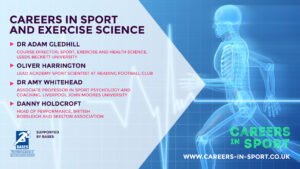Chris Barry
Job title Performance Analyst
Employer English Institute of Sport
Qualifications BSc (Hons) Physiology and Sports Science, Glasgow University

Performance Analyst
Chris Barry is the performance analyst for the English Institute of Sport and works with the British Judo team at the Centre of Excellence in Walsall. He has been involved in Judo as a performer for the last 23 years.
What is the role of a performance analyst?
A performance analyst will provide relevant key performance information to athletes and coaches during and after performance. Information is provided to improve performance through understanding and improving techniques, movement and tactics within a sport. Athletes and coaches can find it difficult to recall in detail what has happened during competition and a performance analyst will provide objective information through a range of performance data. This is done through a four-stage process called capture-code-analyse-feedback.
A performance analyst will be able to assess the demands of a sport or different positions within a team sport and model what is needed to be successful in that sport. They can measure the techniques and tactics of the best performers and then compare them against the athletes they are working with and provide guidance on how athletes can improve and develop.
Performance analysts will also provide information, referred to as pre-competition intelligence, that helps athletes prepare for opponents by analysing their strengths and weaknesses. They will use software, such as Dartfish Video Analysis, to capture athletes’ performances and analyse them. Performance analysts will be part of a performance team that supports coaches and athletes during training.
What qualifications does a performance analyst require?
I did a BSc (Hons) Physiology and Sports Science at Glasgow University which was a four-year degree as all degrees are in Scotland.
At the end of the second year I applied for an internship to work as a performance analyst at Glasgow Warriors. I did this alongside my degree for the last two years and another two years after I had finished studying. I worked with the Scottish National Rugby team as well providing sport science support, including GPS monitoring and wellness monitoring. I got great experience during my degree and the degree itself also gave me a really good understanding of all the other support disciplines.
Internships are a great opportunity to learn new skills and get on the job experience. Check out our latest internship opportunities here.
What is a typical week for a performance analyst?
I am heavily involved in analysing data from competitions and normally there will have been a competition at the weekend and there will be data to be analysed. That will occupy the beginning of my week as well as adding the videos from the weekend’s competition to the database of performances. Usually I’ll have quite a few projects running on individual athletes and because there are different fighting styles, weight categories and differences in genders there is no set template used to analyse a judo player. These projects are based on what individual athletes are trying to develop. I also analyse the upcoming opposition and update our database to ensure we are ready for the next fights. I give in-training support to coaches who may be working with an athlete to develop something technical.
I spend a lot of time in my week sitting and talking to coaches, as I see that as a hugely important part of my role to build the relationship and discuss their work. It might not be about judo but about them and what they are doing as building relationships is one of the most important things you do as support staff. As a performance analyst you have to be trusted by coaches and be relied upon to produce material that is relevant to their athletes.
———————————————————————————————————————————————————————————-
You might also want to explore data entry job opportunities, as they offer valuable experience in effectively analyzing and managing athlete data.
———————————————————————————————————————————————————————————
What technology is beneficial for sports performance analysis?
We’ve got two CCTV cameras that we attach on the walls of the dojo to give two different angles. These are connected to a Wi-Fi router, so we can relay video images to a laptop and use Dartfish software to analyse performance. We can get an athlete to perform a technique and then watch it themselves or we can record it and analyse it later on. The other things I use to capture competition tend to be from an internet stream, so I’ll use a media box that allows me to screen capture and if I’m in the arena I’m able to capture through the media box directly into my laptop. Dartfish and Microsoft Excel are the tools I use the most.
Do you need to have an in-depth knowledge of the sport you are analysing?
That varies a little bit from sport to sport. You have to understand the rules and what it takes to win at the sport, but it depends on the sport whether you need to be an absolute expert in it. Judo is one that is very technical as it is an open skilled, combat sport that is objectively judged and these things require you to know a lot about the sport. However, if you take track cycling, while it may be quite tactical the analysis mostly involves data analysis, such as looking at power and times.
What skills do you need to work in sports performance analysis?
- Developing relationships between yourself and others because without relationship it is pretty difficult to be impactful when discussing technical skills. There are technical skills that you need to do the job but the glue that binds it together is the personal side.
- Communication is one of the biggest skills you need, and it does not involve only how you deliver information but also how you receive it. A coach may want a certain thing analysed but you need to get them to be as explicit as possible with their request.
- Receiving information is hugely important and so you need to make sure that coaches are explicit in asking for what they want.
- Creativity is required, like when you are trying to land a message with someone you need to be creative about how you send that message. What works for some will not work with others, so you need to be creative and figure out ways that will resonate with somebody to get your message across.
- Social and emotional intelligence to read a room and assess what people are thinking and feeling is so important.
- Adaptable – in the world of sport people come and go quite quickly, so you need to be able to be to deal with that and work out who the key stakeholders are, so you know who to keep satisfied and ensure you still have a job. If you don’t satisfy the key stakeholders, they are unlikely to keep you on. Also, you need to be adaptable to changing situations in the competitive environment. For example, at the Paralympics in 2016 almost every time I set up in the arena someone came over and said, ‘you can’t be here, you need to move your stuff’.
- Negotiate with people – I managed to bribe a steward to let me stay where I shouldn’t have technically been by giving him a GB team pin badge. He was happy with that and let me stay there for the whole tournament.
- Reflective – so you can look back at something you have done and how you have done it in that situation, assess it and see what you could have done differently and then implement any changes from your reflection later on. It may have been that you had an argument with someone in a meeting, how did you act in that situation and how could I avoid that kind of confrontation in the future. Being able to reflect on situations and learn from them can make you a better practitioner in the long run.
why not check out our careers advice page which provides important information on key skills like leadership and communication.
What advice would tell young people keen to pursue a role as a performance analyst?
I would suggest going through formal undergraduate education but ensure that any programme you are enrolling on has some form of practical placement on it or actively encourages you find work placement. Theory is only good if it is put into practice. You need to have the experience and have the opportunities to learn about building relationships and find out what it is like working with individuals and within different organisations.
Interview conducted by Simon Rea, Lecturer in Sports Science at The Open University and a Senior Fellow of the Higher Education Academy. Simon is author of many sports science books including Careers in Sports Science:

Available at: Simon Rea Sports Science
Are you interested in a career in sports science? Access more career profiles from leading professionals in the sports science industry via our ‘Sports Science‘ section.

Careers in Sports Science webinar on our YouTube channel

